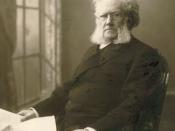In Henrik Ibsen's play A Doll's House, Torvald and his wife, Nora, live a middle class, conservative life with three children. Nora stays at home while Torvald works as a manager at a bank. Previously, when Torvald was sick, Nora forged her father's signature on a bond to receive money for a trip to Italy so Torvald could recover. Only Nils Krogstad, another man at the bank, and Nora's best friend, Linde, know about her terrible secret. Linde and Krogstad have also failed in society like Nora: Krogstad has performed the same act of forgery, and Linde had to work to support her family while most women stayed at home. Nora and Torvald succeed in society but their relationship fails. Ironically, Krogstad and Linde maintain a true relationship although they are both failures. They are able to be honest with each other, converse seriously, and have both been wronged by society.
Therefore, they are already exposed to criticism of the world.
Krogstad and Linde are able to be honest with each other while Nora and Torvald are not. Although Krogstad committed a serious crime and Linde was forced to work to support her family, both of these burdens have already been removed from them. Therefore, they are able to be open because they have no secrets left to conceal. Linde tells Krogstad she believes they must "have a complete understanding [...] which is impossible with [...] concealment and falsehood [...]" (52). Nora keeps a dangerous secret from Torvald in order for them to still appear "normal" to society. Consequently, they are not honest with each other so they cannot keep their marriage together. Nora pretends to "be someone she is not in order to fulfill the role that Torvald, her father, and society at large have expected of her" (Gillis).


